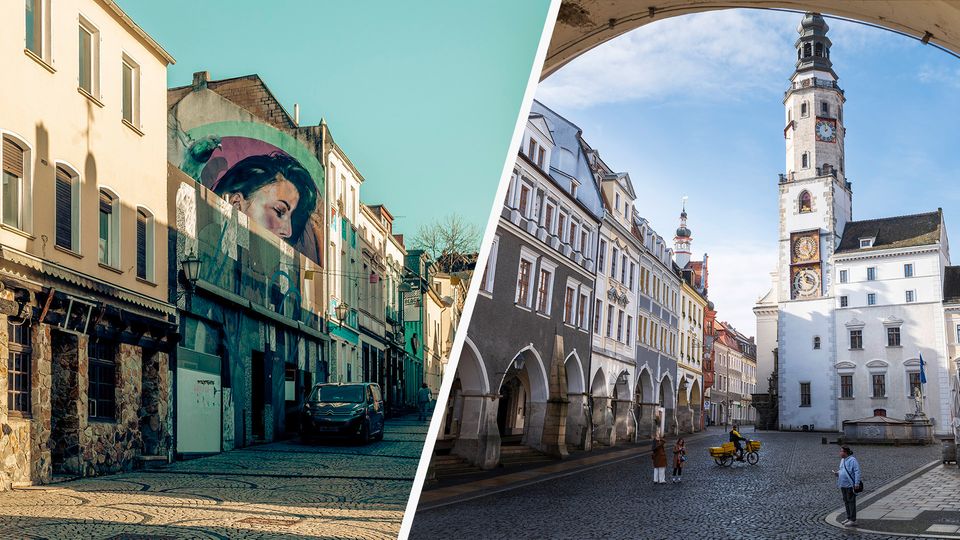The Green Bundestag Vice President Katrin Göring-Eckardt criticizes the fact that East Germany is “just an appendage” at the upcoming anniversary of the Basic Law. This continues the humiliation of the people in the so-called new countries.
Ms. Göring-Eckardt, you were recently harassed again at an election event in East Germany, this time in Brandenburg. How are you doing with that?
I was worried about the people who live there and who had organized and attended the event. Protest is legitimate, threats and intimidation are not. It cannot be the case that democracy events become a risk: for organizers, visitors or participants. Talking about democracy must be possible everywhere. There also needs to be greater awareness among the security authorities. Freedom of demonstration and freedom of expression must be protected, but this also applies to the proper conduct of political events and the protection of politically active people.
People often only talk about the East because of such protests – or because AfD victories are imminent in the so-called Eastern elections. Does this connection annoy you?
Yes, it’s annoying. At the beginning of the year there was the blockade of Robert Habeck in Schlüttsiel in Schleswig-Holstein, and later the political Ash Wednesday in Biberach in Baden-Württemberg was prevented by protesters. At the weekend there were attacks on people who put up election posters in many places in Germany, both in the West and the East. No matter where something like this happens, our constitutional state cannot accept it. And about the Eastern elections: It starts with the term. Nobody would talk about western elections just because the state parliaments are voting in North Rhine-Westphalia, Lower Saxony and Rhineland-Palatinate at the same time. This is because they are very different countries.
Like Saxony, Thuringia or Brandenburg.
Exactly. But in the perception of the West and the capital bubble, these are just three Eastern countries. In this story, East Germany becomes a homogeneous area. But the opposite is true. These are three countries that have grown differently and are governed differently. So: The state parliaments of Saxony, Thuringia and Brandenburg will be elected in September. There should be that much time.
After all, these three countries have 40 years of GDR and almost 35 years of transformation in common – and an above-average one AfD. Doesn’t that worry you?
Yes, it actually worries me a lot. Nevertheless, the AfD is not unique to the East. In Hesse, it recently achieved 18.4 percent in the state elections – and was therefore five percentage points below its last Thuringian election result. In any case, it’s way too much. But the fact that I, because I come from Thuringia, constantly have to justify the high values of the AfD is annoying. It’s really tiring having to explain again and again that not everyone in the East is crazy or a neo-Nazi.
They put things into perspective. Isn’t the AfD on average twice as strong in the East as in the West?
I have absolutely no intention of downplaying this. But even if unfortunately up to a third of people can currently imagine voting for the AfD, that still means that two thirds cannot imagine it. And these two thirds often do more for democracy than many West Germans.
What do you mean?
In Thuringia or Saxony it takes a lot more strength and often courage to get involved against right-wing extremism. Anyone who takes to the streets in Munich or Hamburg has it much easier than someone who demonstrates for our democracy in Saalfeld or Gotha.
Respect and eye level
You said that not everyone in East Germany is crazy or neo-Nazis: shouldn’t this finding also apply to AfD voters?
We should differentiate. Studies show that a large proportion of AfD voters vote for this party precisely because it is extreme, xenophobic or authoritarian. But there are also voters who support the AfD not out of conviction, but rather out of weariness and anger.
How can this be changed?
With respect and eye level. And that brings me to the common Eastern experience of the transformation period: from the mass layoffs to the exchange of elites to the fact that wealth, income and inheritance are extremely unequally distributed. The answer to the question of who owns East German companies, land, apartment buildings and also farmers’ fields today is often: some major investor or West German.
But that can hardly be repaired.
Yes, and billion-dollar settlements by Tesla or Intel won’t change that much. But it would be a start if there was serious discussion about this not only in the East German self-talk, but also at the federal level. This also applies to the question of representation. In 1990, West German elites took over central positions in the administration of the newly formed federal states. In many areas, this transfer of elites from West to East was unavoidable: Which East Germans could have run a higher regional court, a state bank or a state criminal investigation office according to Federal Republic rules? But almost 35 years later, East Germans are still underrepresented in management positions. All these inequalities do something to people. They try hard, but they don’t really make any progress. This creates a feeling of second-class status – which the AfD systematically serves.
And it is on the way to becoming the dominant political force.
I don’t deny that. I’m just promoting a complete picture and a sense of the disruptions that the East Germans were forced to endure. And I advocate recognizing their immense contribution to the common German history.
Like for example?
For example, in which 75 years of the Basic Law are not simply celebrated this May as the anniversary of the old Federal Republic – and East Germany is just an appendage. The peaceful revolution of 1989, which led to the accession of the East German states in 1990, was the completion of the will of the mothers and fathers of the Basic Law. Only since reunification has the constitution applied to all Germans. But unfortunately this is hardly reflected in the anniversary plans. Instead, the old Federal Republic celebrates itself – and the contribution of the East Germans has so far played almost no role.
Aren’t you exaggerating?
As evidence, I would like to quote the man who negotiated unity for the Federal Republic of Germany. This is what Wolfgang Schäuble wrote in his memoirs about the canceled debate about a common constitution: “The people in the GDR wanted to go to a country with the order of the Basic Law. And the West Germans had no desire for change anyway.” Reunification became accession, nothing less – but also nothing more. And it is precisely in this spirit that we are celebrating now. The Basic Law is 75 years old. Point. And, oh yes, the East German states also joined his sphere of influence.
How would you have liked to celebrate?
I advertised a double anniversary in the headline: “75-35”. So 75 years of the Basic Law and 35 years of peaceful revolution. But, as Wolfgang Schäuble wrote: The West Germans have no interest in it. There are a few sidekicks, an exhibition here, a reading there. But even there the East Germans are rather problematized and not presented as an asset.
Federal President Frank-Walter Steinmeier emphasized exactly this double anniversary in his book “We”. Don’t you judge unfairly?
I do not assume that all citizens will now read this essay. It’s about something fundamental – namely that the central constitutional bodies, the Bundestag and the federal government, are threatening to fail in viewing the German constitution as a joint German work.



